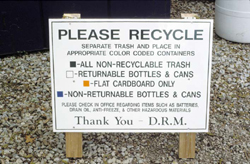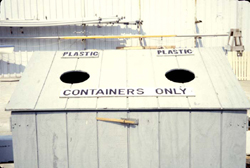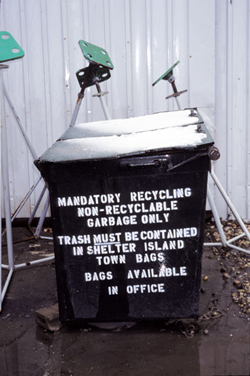New York Sea Grant's
Marina Pollution Prevention Web Site
Section 5: Facility
Management
- Litter & Recycling
Potential Environmental Impacts
Routine marina and boating activities produce a variety of non-hazardous
solid wastes. These include bottles, plastic  bags,
aluminum cans, coffee cups, six pack rings, disposable diapers,
wrapping paper, cigarette filters, and fishing line. This type
of debris is unsightly and can harm some living organisms and
their habitats after it enters the water. A litter free facility
is more attractive to present and potential customers. Diverting
reusable materials out of the waste stream through recycling conserves
natural resources, and reduces the amount of waste that must be
disposed.
bags,
aluminum cans, coffee cups, six pack rings, disposable diapers,
wrapping paper, cigarette filters, and fishing line. This type
of debris is unsightly and can harm some living organisms and
their habitats after it enters the water. A litter free facility
is more attractive to present and potential customers. Diverting
reusable materials out of the waste stream through recycling conserves
natural resources, and reduces the amount of waste that must be
disposed.
Best Management
Practices
Place covered
trash receptacles in convenient locations away from the water
for use by marina patrons.
Provide clearly marked, conveniently located recycling containers
for customers and staff to use, particularly for  plastic,
glass and metal food/beverage containers and other recyclables
generated at your facility.
plastic,
glass and metal food/beverage containers and other recyclables
generated at your facility.
Do not put
trash or recycling containers on docks, as waste can easily blow
into the water.
If practical,
secure trash receptacles at night to prevent "midnight dumping"
since marina operators are responsible for the content of dumpsters.
Train employees
to pick up stray trash as a daily practice.
Purchase products
made with recycled contents to close the recycling loop (i.e.,
create a market for the materials you recycle). Buy recycled printing
and writing paper, towels, tissue, re-refined motor oil and antifreeze.
Educate employees
about separation requirements and your recycling program.
 Encourage
boaters to exchange excess paints, thinners, and varnishes rather
than dispose. Provide a bulletin board where boaters can post
notices if they have or need a particular substance, or establish
a paint and maintenance chemical swap area for customers.
Encourage
boaters to exchange excess paints, thinners, and varnishes rather
than dispose. Provide a bulletin board where boaters can post
notices if they have or need a particular substance, or establish
a paint and maintenance chemical swap area for customers.
Consider cooperating
with other nearby businesses to simplify recycling and reduce
costs. Your municipal recycling coordinator may be able to help
you find or establish a cooperative business-recycling program.
Use reusable or recyclable boat covers for boat storage. Recycle
used plastic boat covers. See "Shrink Wrap," click
here.
Require patrons to clean up after their pets. See "Pet
Waste," click
here.
For information on recycling antifreeze, see "Antifreeze,"
click
here.
For information on recycling batteries, see "Battery Replacement,"
click
here.
Regulatory
Issues
Under federal
law, marina operators must provide areas to collect solid waste
from their customers [33 CFR 151.05, click
here].
Regulations
covering the disposal and recycling of solid waste vary by state
and by municipality. Marina operators should contact their local
municipality regarding specific requirements at their facilities.

